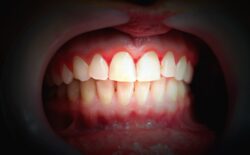 Although frequent headaches, worn teeth, or broken teeth can be caused by several factors, one of the most common culprits is teeth grinding, clinically known as “bruxism.” Many people don’t realize they are even grinding their teeth as it often happens while they are sleeping, but it can also happen throughout the day. Dentists like Arlington Heights, IL dentist Dr. Brent Engelberg of AH Smiles can diagnose teeth grinding and help you with ways to stop it and its side effects.
Although frequent headaches, worn teeth, or broken teeth can be caused by several factors, one of the most common culprits is teeth grinding, clinically known as “bruxism.” Many people don’t realize they are even grinding their teeth as it often happens while they are sleeping, but it can also happen throughout the day. Dentists like Arlington Heights, IL dentist Dr. Brent Engelberg of AH Smiles can diagnose teeth grinding and help you with ways to stop it and its side effects.
Why Do I Grind My Teeth?
Tooth grinding and jaw clenching often indicate an issue with the bite which in this case refers to the alignment of your teeth when you bite down. People who grind or clench their teeth often have uneven bites, such as an underbite or overbite where one set of teeth protrudes further than the other. This can cause uneven wear on your teeth and making chewing or even talking properly difficult.
Teeth grinding is commonly associated with stress. Whether from your own personal environmental factors such as problems at home, work or school or due to stress inside the mouth and jaw from a dental problem, stress can cause your teeth two grind together. When teeth, jaw, and intricate system of muscles in the mouth and neck aren’t working together properly, it creates a tension which can lead to headaches, facial pain, and teeth grinding.
Signs of Teeth Grinding
Dentists can usually easily identify signs of teeth grinding, such as:
- Worn or dull teeth, especially chips or flat spots
- Sensitive teeth
- Jaw pain
- Frequent headaches
- Cuts or sores on the inside cheek
How to Stop Teeth Grinding
A lot of treatments for teeth grinding advise reducing your stress levels with coping mechanisms and medications, which may help you stop grinding your teeth if the cause is external stress. However, if that stress is inside the mouth and out of your control, you’ll need other methods to help stop teeth grinding. Often, stress reduction and occlusal appliances are combined to treat bruxism.
There are a few different options available in the form of occlusal appliances, which are plastic appliances worn in your mouth to prevent teeth grinding. You might be familiar with night guards, which are a type of occlusal appliance. These are custom-fitted to each patient’s mouth and designed to fit over the top or bottom teeth to stop nighttime teeth grinding.
For more severe cases, your dentist may recommend mandibular advancement devices, which are designed to bring the jaw forward when the dentist suspects a sleep disorder is causing the problem. These devices are often referred to as “snore guards,” as they are traditionally used to align the jaw during sleep to treat sleep apnea or snoring.
Bruxism Treatment in Arlington Heights, IL
Teeth grinding can damage teeth and prevent you from living a pain-free life, so it’s important to seek treatment if you grind your teeth. Call AH Smiles at (847) 230-9703 for a consultation with Dr. Engelberg or schedule with us online. We can help you put an end to bruxism and keep your teeth and mouth healthy.
